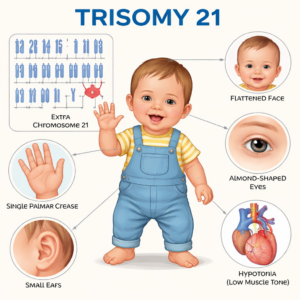Being a parent is a journey filled with joy, challenges, and countless questions about your child’s development. Among these concerns, understanding attention deficit hyperactivity disorder (ADHD) symptoms can be particularly daunting. ADHD is one of the most common neurodevelopmental disorders in children, and early detection can make a significant difference in managing it effectively. We will walk you through recognizing ADHD symptoms, identifying early signs in toddlers, and how tools like the “Family Health Checker app” can support you.
What are ADHD Symptoms?
ADHD is characterized by patterns of inattention, hyperactivity, and impulsivity that interfere with daily functioning and development. While symptoms can vary widely from child to child, some common indicators include:
Inattention:
- Difficulty sustaining attention in tasks or play
- Frequently makes careless mistakes in schoolwork
- Often seems not to listen when spoken to directly
- Easily distracted by extraneous stimuli
Hyperactivity:
- Fidgets with hands or feet; squirms in seat
- Runs or climbs in inappropriate situations
- Unable to play or engage quietly
Impulsivity:
- Blurts out answers before questions have been completed
- Difficulty waiting for their turn
- Interrupts or intrudes on others’ conversations or games
Understanding these symptoms helps parents and caregivers recognize potential ADHD early on, enabling timely intervention.
Early Signs of ADHD in Toddlers
Recognizing ADHD symptoms in toddlers can be challenging as many behaviors are typical for young children. However, some signs might suggest a closer look:
- Excessive Fidgeting: While all toddlers are active, those with ADHD may exhibit more restlessness than their peers.
- Difficulty Following Directions: Persistent inability to follow simple instructions could signal attention difficulties.
- Short Attention Span: Although normal for toddlers to have short attention spans, those with ADHD might struggle significantly more.
Observing these behaviors consistently across different settings (at home, daycare, and social gatherings) can provide critical clues.
The Importance of Early Detection
Identifying ADHD early can significantly improve outcomes for children. Early intervention strategies may include behavioral therapy, educational support, and possibly medication. These interventions can help manage symptoms effectively and foster better developmental trajectories. Moreover, early detection allows families to access resources and guidance sooner, reducing stress and improving quality of life.
Expert Tips for Parents
Here are some practical strategies from experts to help manage your child’s development journey:
- Stay Informed: Educate yourself about ADHD through reputable sources and professional consultations.
- Create Routines: Consistent daily routines can offer structure and reduce impulsivity.
- Encourage Physical Activity: Regular exercise helps channel excess energy positively.
- Seek Support: Connect with support groups or counseling services for additional guidance.
Remember that each child is unique; what works for one may not work for another. Patience and persistence are key to finding the right approach.
How the “Family Health Checker” App Can Help
Understanding ADHD symptoms is important for early intervention and effective management. By familiarizing yourself with common indicators and leveraging innovative tools like the “Family Health Checker” app, you can guide your child toward a healthier developmental path. This app is designed to help parents address concerns about their child’s developmental and genetic health by offering AI-powered assessments through a free, easy-to-use platform. Many developmental delays may be linked to genetic factors and early diagnosis and intervention are essential.
Once the assessment is completed, parents are provided with a free report outlining possible areas of concern. The app also provides options for connecting with healthcare professionals for further evaluation and a no-cost genetic test for eligible children. With its secure, user-friendly design and compatibility across various devices, the Family Health Checker app enables parents to assess their child’s development comfortably from home. Though AI tools offer valuable assistance in the diagnostic journey, a healthcare professional’s evaluation is essential for definitive diagnosis and customized guidance.



